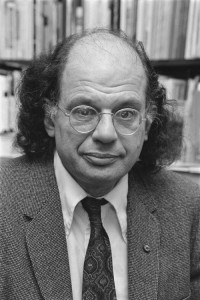National Poetry Month: Allen Ginsberg
Tuesday, April 27th, 2021April is National Poetry Month, an annual celebration of this unique form of literature. Each week, Behind the Headlines will feature the art of poetry or a famous poet.
“I saw the best minds of my generation destroyed by madness….”
So begins the epic poem Howl by the American poet Allen Ginsberg. In the poem, Ginsberg rails at length against dehumanizing forces in modern society. He also laments their effect on the people in his life.
Howl, first read publicly in October 1955, shocked audiences with its graphic descriptions of violence, mental illness, sexuality, and drug abuse. The poem’s publisher, Lawrence Ferlinghetti, was even charged with obscenity. However, Howl came to be seen as a revolutionary work of great indignation and humanity, and Ginsberg has come to be honored among the greatest modern poets.
Ginsberg was born on June 3, 1926, in Newark, New Jersey. He became known as a leader of the beat literary movement of the 1950′s and also of the cultural and political protests of the 1960′s. Critics have praised him as a prophetic poet in the tradition of William Blake of England and Walt Whitman of the United States.
Ginsberg’s writing combines the spiritual and rhythmic qualities of certain Eastern and Western religious texts with the language, imagery, and subject matter of modern life. Many critics see him as representing a struggle for spiritual survival in a dehumanized, repressive society.
The death of Ginsberg’s mother in 1956 inspired his famous elegy “Kaddish” (1961). His other works include Reality Sandwiches (1963), The Fall of America: Poems of These States (1972), and Mind Breaths (1978). Ginsberg died on April 5, 1997. His Collected Poems 1947-1997 was published in 2006. Wait Till I’m Dead: Uncollected Poems was published in 2016.



